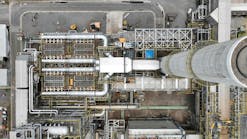Reliance expands desalination plant at Jamnagar refinery
Reliance Industries Ltd. (RIL), Mumbai, is scheduled to receive proprietary PX technology from Energy Recovery Inc., San Leandro, Calif., as part of an expansion that will switch current desalination operations from a thermal to reverse osmosis process at its Jamnagar refining and petrochemical complex in Gujarat, India.
Energy Recovery has shipped its PX Q300 pressure exchangers to the Jamnagar complex for the seawater reverse osmosis (SWRO) desalination expansion, Energy Recovery said.
The PX technology will add 188,000 cu m/day of capacity to the Jamnagar desalination plant, which has expanded twice since it was first commissioned in 1998, according to Energy Recovery.
A value of the order was not disclosed.
The shipment of Energy Recovery’s pressure exchangers follows a contract RIL let to IDE Technologies Ltd., Kadima, Israel, for its proprietary SWRO desalination solution to meet the increased water-capacity needs of the Jamnagar complex, according to a Dec. 11, 2013, release from IDE Technologies.
The expanded desalination plant, which will be located close to the sea to decrease the length of connecting pipes to the refinery and reduce pump-related costs, will deliver high-quality boiler-feed water as well as potable water to the complex using a multi-effect distillation seawater desalination solution, IDE Technologies said.
With a current capacity of 160,000 cu m/day, the Jamnagar desalination plant ultimately will reach a total capacity of 400,000 cu m/day once the reverse osmosis plant installation and expansion project is completed, IDE Technologies said.
The need for increased desalination operations at Jamnagar stems from the ongoing expansion of the refining and petrochemical complex, which aims to boost Jamnagar’s crude processing capabilities as well as its derivative production capacities (OGJ Online, Aug. 8, 2014; Jan. 22, 2014), RIL said in a Dec. 16, 2013, release.
During the 2013-14 fiscal year, the Jamnagar integrated refining complex, the world’s largest, processed 68 million tonne/year of crude to operate at 110% above its 33 million-tpy design capacity, according to RIL’s annual report.
